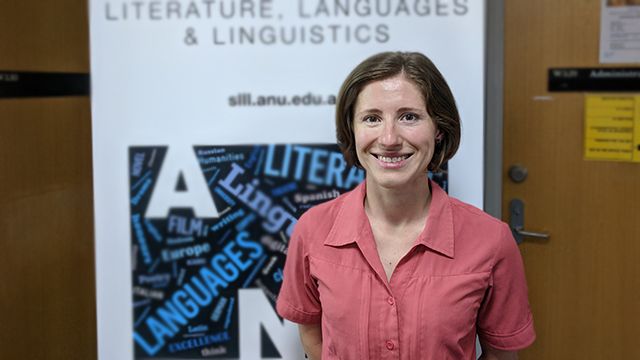New research explores how we tell someone's age from their voice

Dr Ksenia Gnevsheva. Image: supplied.
We’re pretty good at guessing how old someone is just by hearing their voice. However, we’re not uniformly good at estimating the age of all people – we’re better with some groups than others.
So what accounts for this difference? Dr Ksenia Gnevsheva from the ANU School of Literature, Languages and Linguistics and Dr Daniel Bürkle from the University of Central Lancashire have been looking into this. Their latest research on age estimation draws upon Dr Gnevsheva’s interest in second language and accented speakers.
“I asked myself, what happens if you are estimating the age of a non-native speaker of English? How does that affect it?”
She conducted two studies with native speakers of Japanese, and native speakers of English. Both groups of speakers listened to other Japanese and English native speakers speaking in English.
“We're good at estimating a speaker's age because of physiological changes that happen to all of us irrespective of our first language,” Dr Gnevsheva says. “That is, the deepening pitch of our voices as we age.”
“But what if there's a social element to that as well? This is why I wanted to explore language because it’s something that would help us to uncover if there is a social element to age estimation and the way age is reflected in our voice.
“If it's purely physiological, then we would not find differences between the language groups.”
She did find differences between the two language groups. Each were better at estimating the age of native speakers of their own language. So, the Japanese listeners were not as accurate as English listeners judging English speakers, but they were more accurate when listening to the Japanese speakers.
“They’ve not had as much exposure to the English language,” Dr Gnevsheva says.
“So they do not catch all the cues that a native speaker of English would in order to estimate the age of those speakers.”
Dr Gnevsheva determined that the listeners in her study relied on a couple of characteristics in making their judgements. The one that turned out to be significant in her study was pitch.
A native speaker of Japanese, for instance, speaking Japanese will speak at a different pitch compared to a native speaker of English speaking English. So, your pitch isn’t just physiologically determined, it's also socio-culturally and linguistically determined.
Women might also, consciously or unconsciously, speak in a higher pitch to sound more friendly and feminine.
“These are some of the social cues that non-native speakers of English may have difficulty hearing, but also acquiring in their own speech,” Dr Gnevsheva says.
“If in their second language, let's say English, there's a certain pitch that would be most appropriate given your body size and composition, then the non-native speakers would have to learn what it is in order to sound appropriate.”
Although she didn’t measure these things, word choice and pronunciation also differ between people of different ages in the same locality, and are consequently clues to someone’s age.
“Our voices encode so much social information and we don't even realise it,” Dr Gnevsheva says.
She’s still analysing the data from another age estimation study, which she worked on with colleagues from the University of Canterbury. That involves native speakers of Chinese, Korean and Arabic listening to and speaking in English. So far it seems there’s an effect of distance, or familiarity, between languages.
“So, Mandarin-Chinese listeners were more accurate estimating the age of a Mandarin-Chinese speaker than Korean speaker and least accurate with an Arabic speaker.
“The story there is that a Mandarin-Chinese speaker would be more familiar with Korean accented English than Arabic-accented English.”
She continues: “The more familiar you are with a certain language or accent, the more accurate you'll be at estimating the age – and it'll apply to other things, not just age.”
In terms of the application of research such as hers on age estimation, Dr Gnevsheva talks about its relevance for language learning – that understanding grammar and vocabulary isn’t everything. Pronunciation that is appropriate for your age or sex would be useful to learn too, in order to properly assimilate.
The findings may have utility in the area of forensic linguistics also.
“If you know that listeners consistently under-estimate the age of, say, Japanese accented speakers, then you can say, if my voice witness says this person is 40 years old, I can be pretty sure this person is actually 45 years old.”
Dr Gnevsheva also just finds this area fascinating from a theoretical perspective.
“Age and many other social categories are often perceived as things that are beyond our conscious or subconscious control in the way we express these things,” she says.
“The fact that it may be more fluid and there are social aspects to it, not just physiological aspects is very interesting.”